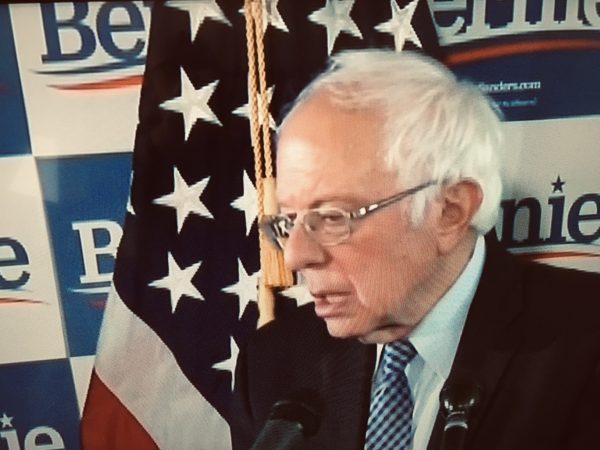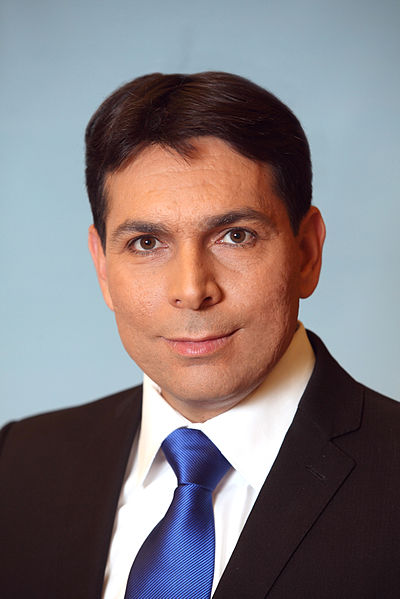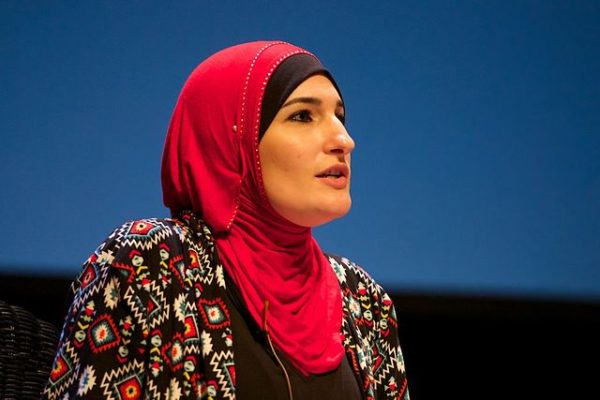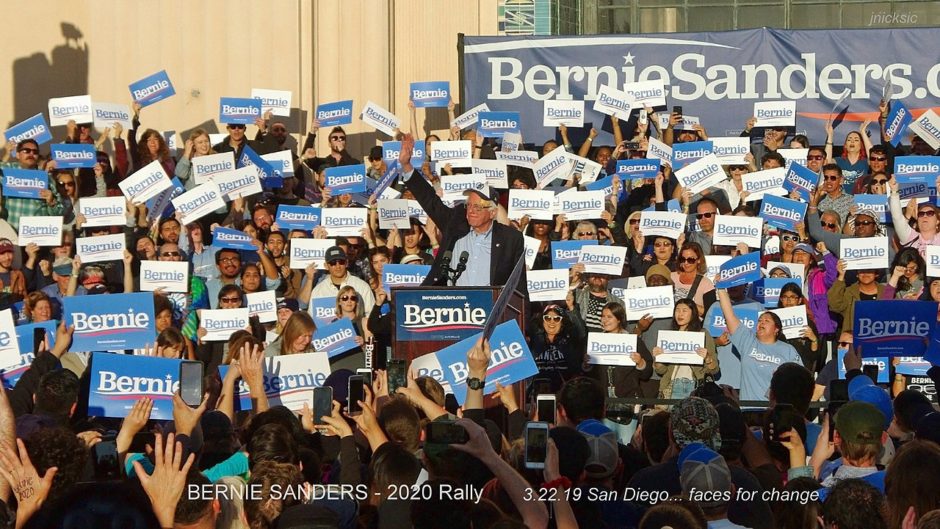It’s questionable whether Senator Bernie Sanders (Independent, Vermont) will be the Democratic Party’s nominee for the U.S. presidency now that Joe Biden, the vice-president under President Barack Obama, has regained his footing and pulled ahead of him in the quest for delegates.

Yet if Sanders, a democratic socialist, can overtake and defeat Biden, he would not only be the first Jewish American to clinch the nomination, but the first presidential aspirant who, if elected, might seriously alter the dynamics of the United States’ strategic relationship with Israel, one of its closest allies.
Until the primary in South Carolina and the Super Tuesday primaries on March 3, Sanders was the Democratic frontrunner, prompting speculation that he had the nomination all but sown up. But after Biden’s string of victories and the withdrawal of Amy Klobochar, Pete Buttigieg, Michael Bloomberg and Elizabeth Warren from the contest, Sanders lost momentum, plus his status as the leading contender.

Despite Biden’s ascendancy, Sanders, 78, remains a formidable political force. And if he can topple Biden, a moderate, he would face the Republican incumbent, Donald Trump, the most pro-Israel of presidents, in the November election.
Strangely enough, Sanders’ ascent coincides with an upsurge of overt antisemitism in the United States. In 2018, neo-Nazi thugs attacked a synagogue in Pittsburgh, Pennsylvania, and in Poway, California, causing a total of 12 fatalities. Last year, a kosher market in Jersey City, New Jersey, was stormed and three people were killed. Meanwhile, there have been near-fatal attacks on Jewish institutions around the country.
This foul tide of antisemitism swept into a Sanders rally in Phoenix, Arizona, on March 6 when a white supremacist disrupted his rally by waving a flag emblazoned with the Nazi swastika.

In an implicit reference to Sanders, Jonathan Greenblatt, the chief executive officer of the Anti-Defamation League, said recently, “We’re living in a moment where we know antisemitism is on the rise, and yet Jewish Americans are reaching the pinnacle of our politics.”
Sanders, whose platform advocates sweeping reforms in the economy and in the provision of higher education and health care for all Americans, has his eyes set on recalibrating U.S. foreign policy. As far as Israel is concerned, he is calling for a “fundamental change” in its relations with the Jewish state so that a greater balance is struck between Israel’s need for security and peace and Palestinian national rights.
As he said in a recent speech, “I am a strong supporter of the right of Israel to exist in independence, peace and security. But I also believe that the United States needs to engage in an even-handed approach toward the-long-standing (Arab-Israeli) conflict which results in ending the Israeli occupation and enables the Palestinian people to have independence and self-determination in a sovereign, independent, economically viable state of their own.”
Despite being Jewish, Sanders is the most outspoken Democratic critic of Israel. His left-of-center views have gained ground in the party’s base and particularly in its progressive wing. Sanders’ followers equate the struggles of racial minorities in the United States with the Palestinians’ quest for statehood.
David Harris, the chief executive officer of the American Jewish Committee, is certain that a Sanders presidency would be different with respect to Israel. “It’s very hard to say at this point that (he) falls within the parameters of traditional U.S. foreign policy,” he said. “I have little doubt that Sanders’ foreign policy in the Middle East would look very different from (Donald Trump’s) foreign policy.”
In a video released by his office, Sanders says he is “very proud to be Jewish” and “looks forward to becoming the first Jewish president in the history of this country.” But in his comments regarding Israel’s complex dispute with the Palestinians, he strikes a balanced tone that right-wingers would regard as hostile.

American policy cannot be “just pro-Israel,” nor can it ignore “the needs of the Palestinian people,” he said in January in a stinging rebuke of the Trump administration’s peace plan, which was dismissed by the Palestinians and is widely regarded as favoring Israel.
A month earlier, Sanders said, “What U.S. foreign policy must be about is not just being pro-Israel. We must be pro-Palestinbian as well.”
Last October, Sanders called for a portion of the annual $3.8 billion military aid package the United States provides to Israel to be leveraged toward humanitarian relief in the Gaza Strip, a roll back of Israel’s settlement program in the West Bank, and a resumption of peace negotiations with the Palestinians.
“It is a lot of money, and we cannot give it carte blanche to the Israeli government, or for that matter to any government at all,” he said. “We have a right to demand respect for human rights and democracy. What is going on in Gaza right now is absolutely inhumane. It is unacceptable. It is unsustainable.”
Sanders is a sharp critic of Israeli Prime Minister Benjamin Netanyahu, whose right-wing Likud Party and like-minded nationalist parties have governed Israel in coalitions since 2009. Last year, he condemned Netanyahu’s approach toward the Palestinians as “oppressive” and described his government as “racist.” At the fifth Democrat debate in December, he elaborated on this theme: “We must understand that right now in Israel we have a leadership under Netanyahu, who has recently, as you know, been indicted for bribery, and who, in my view, is a racist.”
He added, “What we need is a level playing field in terms of the Middle East.”
Toward the end of February, he renewed his attack on Netanyahu. As he put it, “I am very proud of being Jewish. I actually lived in Israel for some months, but what I happen to believe is that right now, sadly, tragically, in Israel, through Bibi Netanyahu, you have a reactionary racist who is now running that country.”

By way of response, Israel’s ambassador to the United Nations, Danny Danon, denounced Sanders as either a “liar” or “an ignorant fool” and declared he is not welcome in Israel.
Replying to Danon, Sanders said, “I am pro-Israel. I am pro-Palestinian. I want to bring people together to finally achieve peace in that region. I am not anti-Israel. I will do everything I can to protect the independence and the security and the freedom of the Israeli people.”
At the most recent Democratic debate last month, Sanders was asked by a moderator whether he would cancel Trump’s decision in 2017 to move the U.S. embassy in Tel Aviv to Jerusalem. “The answer is it’s something we would take into consideration,” he said.
Sanders’ non-committal answer angered Israeli Foreign Minister Israel Katz, who said, “That remark is shocking.”

In his reaction, U.S. Vice-President Mike Pence delivered a politically partisan speech. Speaking at the American Israeli Public Affairs Committee’s annual conference in Washington, D.C. earlier this month, he said, “The most pro-Israel president in history must not be replaced by one who would be the most anti-Israel president in the history of this nation. That’s why we need four more years of President Trump in the White House.”
Unlike some of his Democratic rivals, Sanders did not attend that conference. In tweets, he explained his absence by saying that AIPAC provides a platform “for leaders who express bigotry and oppose basic Palestinian rights.”
AIPAC hit back, branding Sanders’ comments “truly shameful” and “odious.”
Not surprisingly, Sanders was shaped by his Jewish and working-class background. His father, Elias, a Polish Jew who immigrated to the United States in 1921 at the age of 17, was a paint salesman who lived from paycheck to paycheck. As he said last month of his ancestral roots, “It impacts me very profoundly. When I try to think about the views that I came to hold there are two factors. One, I grew up in a family that didn’t have a lot of money … and the second one is being Jewish.”

As a child in Brooklyn, he recalled, tears rolled down his cheeks when he read about the fate of European Jews during the Holocaust. He also remembered seeing Holocaust survivors with Nazi concentration camp numbers tattooed on their arms. And during a trip to his father’s hometown in Dobra, Poland, he said, locals showed him and his brother a place where Jews were cold-bloodedly murdered by the Nazis.
Sanders’ critics are not impressed by his stories.
They claim that, as president, Sanders would upend decades of bipartisan support for Israel and undermine Israel’s security. As evidence, they point to some of his most ardent supporters. Among others, they include the Palestinian American activist Linda Sarsour and the House of Representatives members Ilhan Omar, Rashida Tlaib and Alexandria Ocasio-Cortez, all of whom endorse the Boycott, Divestment and Sanctions (BDS) movement.

Sanders has not embraced the BDS movement, but believes that its backers have a constitutional right to protest Israel’s policies toward the Palestinians.
Although most American Jews vote for the Democratic Party, 45 percent have an unfavorable opinion of Sanders, according to a recent poll. Another survey, released by Pew Research in January, shows that Sanders drew only 11 percent of Democratic Jewish voters, far less than Biden or Elizabeth Warren.
Sanders, though, is quite popular with Muslim Americans, three-quarters of whom have voted for the Democratic Party since the 2012 presidential election. In a recent poll of Muslim Democrats conducted by the Council on American-Islamic Relations, 39 percent expressed support for Sanders, compared to 27 percent for Biden.
Sanders, whose campaign manager Faiz Shakir is the son of Pakistani Muslim immigrants, has a long history of outreach to American Muslims, and is the only presidential contender in this year’s race to have visited a mosque.
If elected president, Sanders would not be the first U.S. president to adopt a critical approach to Israel.

During the 1950s, Dwight Eisenhower twice threatened to cut aid to Israel. Gerald Ford, in 1975, threatened to “reassess” relations with Israel. Jimmy Carter criticized Israel’s settlement project beyond the pre-1967 Green Line. Ronald Reagan temporarily stopped the shipment of advanced aircraft to Israel in 1982. George H.W. Bush threatened to withhold $10 billion in loan guarantees if Israel continued to expand its settlements in the West Bank. Barack Obama had tense relations with Netanyahu.
Despite these blips, Israel’s special relations with the United States have endured. What would happen under a Sanders presidency remains to be seen. But it would not be business as usual. That much seems certain.
